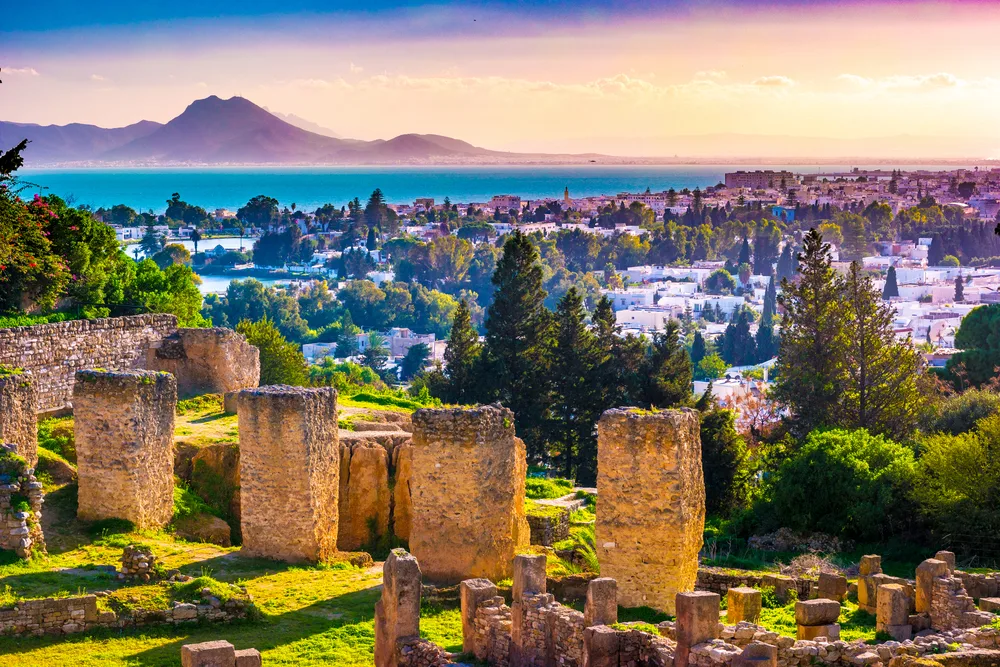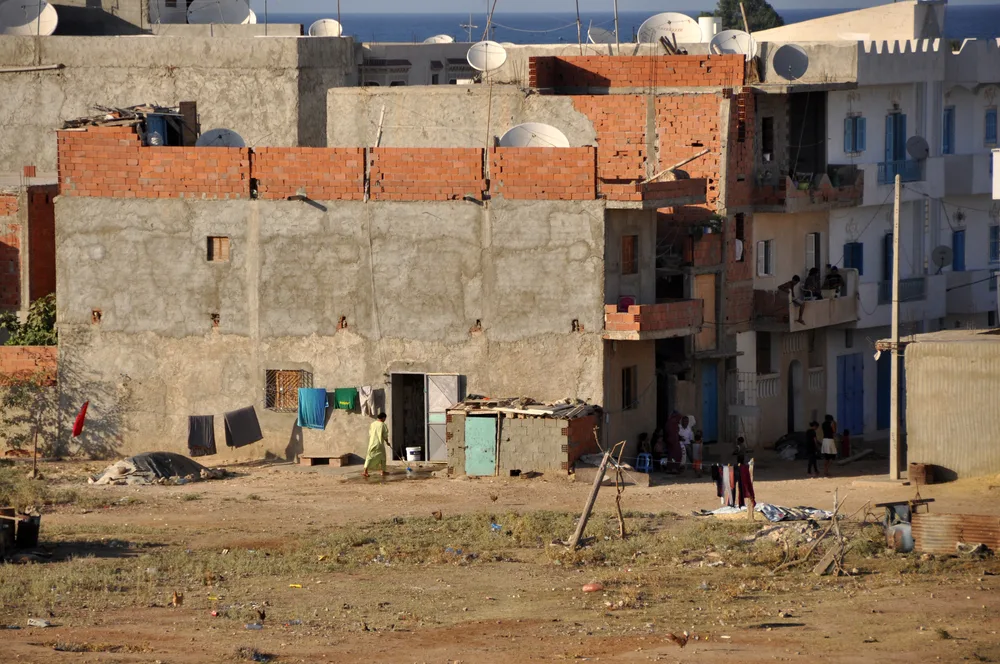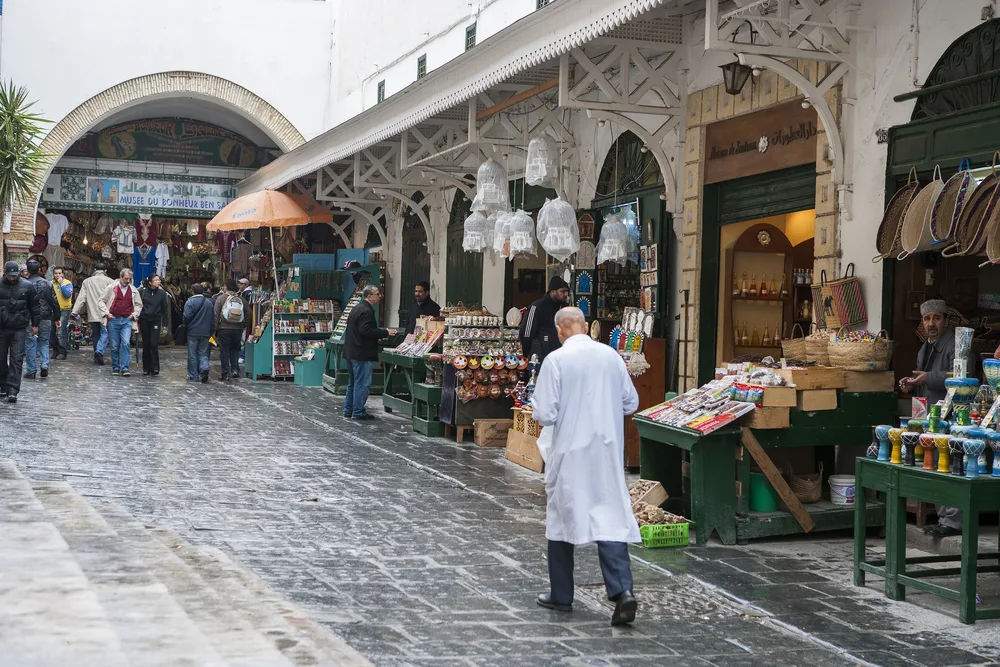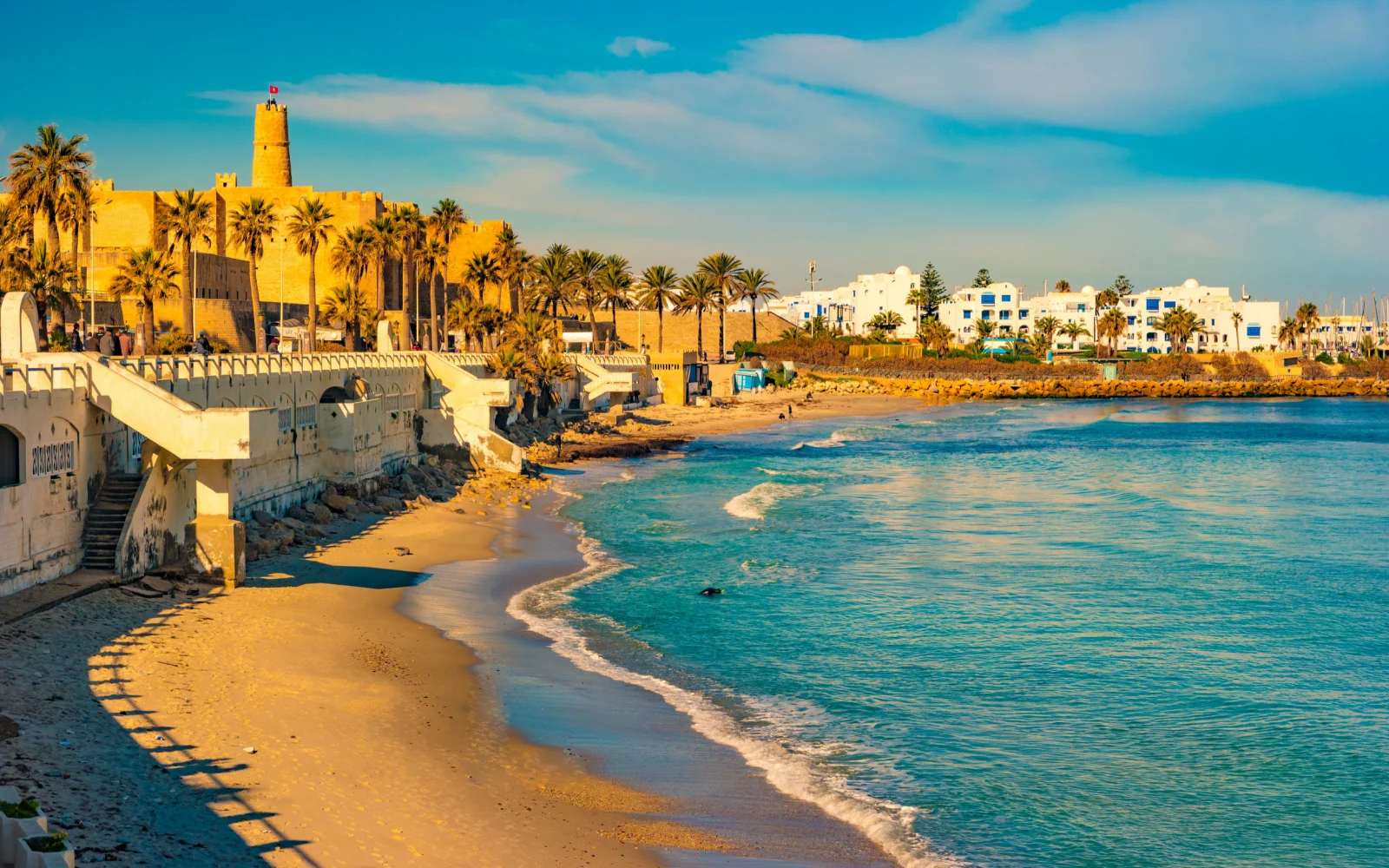Beautiful Tunisia, hugging North Africa’s Mediterranean Coast, is a wonderful place to visit. Many vacationers come for the Mediterranean Coast, including resort towns such as Djerba and Sidi Bou Said.
You can spend days wandering through North African villages, souks, and beaches. Tunisia was also an important historical crossroads of the ancient world. It was home to two powerful ancient civilizations, Carthage and Rome, that left their mark on the country.
Even people who aren’t history buffs will look in awe at the ruins of the once-mighty city of Carthage or Roman landmarks such as the amphitheater of El Djem.
But while this storied country is rich in culture, history, and amazing coastal beauty, is Tunisia safe to visit? Here’s our take.
Is Tunisia Safe to Visit in 2025?

Romas_Photo/Shutterstock
Not really. Visitors to Tunisia need to be cautious due to a moderate but present risk of terrorism, which has targeted tourists in the past.
Tunisia is also undergoing civil unrest as of early 2023 due to dissatisfaction with the president’s dissolution of Parliament. While you will need to be careful during your visit, you can still visit the country safely.
The biggest threat most foreign governments cite in their advisory for Tunisia is terrorism. For example, the Australian government tells its citizens to exercise a high degree of caution during your visit and avoid all travel to certain regions due to the possibility of terrorism.
It’s not poor Tunisia’s fault that it’s in a bit of a rough neighborhood. Instability in neighboring countries often bleeds into Tunisia, which is why most foreign governments advise their citizens against traveling to Tunisia’s land borders.
Neighboring Libya is trapped in a decade-long anarchic civil war, creating a power vacuum that allows warlords and terrorist groups to flourish, some of which operate on the Tunisian side of the border as well.
There is also heightened violence near the Algerian border. Another challenge Tunisia is facing right now is ongoing civil unrest and political instability.
Hopes that Tunisia would be the only successful country of the Arab Spring came crashing down when the president Kais Saied dissolved the Tunisian Parliament in December 2021 and replaced it with a much weaker legislative body.
Protests and strikes have been ongoing ever since, some announced while others are spontaneous. The government response is often violent, so it’s best to avoid these demonstrations.
Besides these more serious concerns, Tunisia experiences more mundane safety challenges such as petty crime. As with many other places worldwide, Tunisia has pickpockets and bag snatchers.
They often operate around popular tourist destinations such as the capital, Tunis, and beach towns. More violent crime such as armed robbery and kidnapping happens, but usually in the more dangerous border regions.
Another often-overlooked factor to think about when you visit Tunisia is the weather.
The summer gets very hot, with average highs reaching well over 90 degrees Fahrenheit. Avoid visiting in the hottest months. When you visit, make sure you stay hydrated and protect yourself from direct exposure to the sun.
To recap, the main problems you should worry about in Tunisia are:
- Terrorism
- Petty theft
- Kidnapping
- Civil unrest
- Heatstroke
Crime in Tunisia

8 May 2022, Tunisia, Tunis: Demonstrators take part in a rally at Avenue Habib Bourguiba in Tunis, to show support to Tunisian President Kais Saied/Hasan Mrad/Shutterstock
Crime is not the biggest factor that will affect your journey to Tunisia. The overall crime rate is moderate. Compared to its neighboring countries, Tunisia has a quite low crime rate.
The violent crime rate in Tunisia is not that bad. In 2020, its crime rate was 4.76 incidents per 100,000 people, which is lower than the global average.
Although high-profile violent incidents such as terrorist attacks do occur, the overall rate of violent crime is low. One caveat to keep in mind when looking at the crime rate is that crime statistics may not be the most accurate.
Violent crime incidents such as kidnapping and terrorism are concentrated in certain regions, such as the border areas and Mount Chambi National Park, where the government also has less control so may have less accurate statistics.
Plus, the Tunisian government is under a state of emergency and may not want to share all information for security reasons.
In terms of overall crime, Tunisia is also doing well. According to Statista, it scores 44.29 points out of 100 on the crime index, meaning that its crime rate is moderate.
The statistics company says Tunisia has the lowest crime rate in the entire North African region, making it one of the safest places to travel to. Finally, for a better look at the crime rate in Tunisia, let’s look at what the locals think.
According to public opinion surveyor Numbeo, 44.90% of people worry about the crime rate in Tunisia, although most think the crime rate is rising.
Most agree that violent crime rates are low, and they mostly worry about drug usage, break-ins, and robberies. The most prevalent crime is corruption, something that is an unfortunate reality for Tunisians but won’t affect most tourists.
Petty Theft
The most common problem you are likely to encounter in Tunisia is petty theft. Street crime is moderate but prevalent, and according to the Canadian government advisory, is becoming more common due to the political instability over the past few years.
Most incidents of street crime involve non-violent crimes of opportunity such as tourist scams, pickpocketing, and bag snatching. Some more aggressive incidents of theft can occur, such as vehicle break-ins or hotel break-ins.
Pickpockets usually operate in places where they know tourists frequent, such as the capital, Tunis, and popular beach towns such as Djerba island. Of course, you should have basic situational awareness wherever you go, particularly if you wind up in a crowd.
The tips you can use to protect yourself from pickpockets and petty thieves in Tunisia are pretty much the same as the tips you should follow anywhere else you go.
Make sure not to wear expensive jewelry or otherwise flash your valuables. Tunisia isn’t one of those places where you should be afraid to use your phone in public, but still avoid behavior that might make you a very obvious target.
Make sure you keep your valuables in a safe place. Put them in a front pocket instead of a back pocket, and inner pockets of your bag instead of outer pockets.
When you leave your hotel room, lock up your valuables in a hotel safe or at least put them in a drawer where they’re out of sight instead of in plain sight. The same applies for valuables that you leave in your car. You should also research common travel scams.
Beware of people offering to take you to a great restaurant, souvenir shop, or factory as they might be in on the scam and get a cut of the commission. You should also be careful of people approaching you to give directions as they might also ask for payment.
Again, using common sense can help you out. Tunisian people are friendly but be reserved when someone approaches you in the street and don’t share personal information.
Terrorism
The most worrying crime people probably will warn you about when you go to Tunisia is terrorism. Although terrorism isn’t a daily event, it is a regular enough occurrence for people, including locals, to be worried.
The government has imposed a state of emergency on the country since 2015 due to the threat of terrorism. There are a few different terrorist groups operating in Tunisia.
Most groups are cells under the control of Al-Qaeda or ISIS. Terrorist groups that bleed over from neighboring Libya and Algeria add to the instability.
Terrorist groups mostly operate in regions near the border as well as southern Tunisia, for example around the towns of Nefta, Douz, and Medenine. However, they can carry out attacks anywhere in the country, including Tunis, the capital, and the beach town of Sousse.
In 2015, an attack in Sousse killed over three dozen foreign nationals and was the incident that prompted the national state of emergency.
The good news is that the threat of terrorism is decreasing. Despite sporadic incidents, including a few knife attacks in 2022 in Tunis, the rate of incidents has decreased over the past few years.
The United States government has even praised the Tunisian government’s counterterrorism efforts. There really is no way to prevent yourself from being the victim of a terrorist attack as they can occur anywhere, at any time (even when you’re at home, not in Tunisia).
The best thing you can do is read up on the news before you visit. Our guide is a starting point, but we are unable to update these every day, so while it’s safe as of right now, that could change any day.
If the government issues warnings about potential tourist attacks, avoid dangerous areas or cancel your trip. Stay alert while in crowded areas and leave if your instincts tell you a situation is dangerous.
Avoiding Bad Areas

KAIROUAN, TUNISIA – AUGUST 04 2010: a Dilapidated house for the poor locals. Normal weekday/Irina Kalinina/Shutterstock
The best thing you can do to ensure your safety in Tunisia is to stay away from bad areas. Luckily, they are well-announced by the Tunisian government itself and most foreign governments.
Avoid the areas around the land borders with Libya and Algeria as the regions are unstable due to conflict across the border. The towns of El Bhorma and Dhehiba in the south are part of a militarized zone.
The government is working to stabilize the area, but there is still a much higher risk of terrorism and kidnapping in this region. The governorate of Kasserine in western Tunisia is another region to stay away from.
This region is home to beautiful tourist attractions such as Mount Chambi National Park but is also home to a lot of terrorist cells. The military is undergoing frequent operations to try to pacify the area, and you don’t want to get caught in the middle.
Things to Consider
Here are a few things to keep in mind when visiting Tunisia:
- Avoid protests or large gatherings because they are very volatile. If you notice a crowd gathering, get out of the area first, ask questions later.
- Female travelers often face sexual harassment in Tunisia. This is usually confined to catcalling, but there have been more serious situations of assault.
- Tunisia is a conservative country, so dress like the locals to avoid sticking out. Within private resorts, you can usually dress as you wish.
- Be careful driving. Roads are not uniformly well-maintained, so be careful when you are driving in the country.
Frequently Asked Questions

TUNIS, TUNISIA – FEBRUARY 3: People in a souk of the medina on February 3, 2009 in Tunis, Tunisia. It is Tunisia’s largest city, the greater metropolitan area holding some 2,700,000 inhabitants/Posztos/Shutterstock
Here are some other questions you might want to know the answer to before visiting Tunisia:
Is Tunisia safe to visit in 2023?
Tunisia is safe to visit in 2023 as long as you do your research ahead of time. There have been a few incidents of civil unrest this year so far, so keep that in mind before you visit.
Is Tunisia safe to walk around?
Most towns in Tunisia are safe to walk around and explore that way. However, you shouldn’t walk around at night in unfamiliar areas as the situation gets a bit more volatile.
Is Tunisia safe for female tourists?
Street harassment of women is common in Tunisia, and catcallers often target foreign women because they stand out. There have also been cases of more serious assault against female tourists. However, Tunisia is a lot safer for female tourists than other countries in the region.
Is Tunisia worth visiting?
Tunisia is absolutely worth visiting. It has beautiful beaches and an incredibly rich history, with lots of ancient sites to explore. The risks are absolutely worth it to see this stunning country.
Is Tunisia safer than Egypt?
Many people are equally nervous about visiting Tunisia and Egypt. However, Tunisia is safer as crime rates are much lower, especially the rate of pickpocketing and tourist scams.
So, Is Tunisia Safe to Visit in 2025?
Tunisia definitely has its challenges to confront, such as civil unrest, terrorism, and a growing petty crime rate. You should be aware of those challenges before visiting, but you can still have a great time in the country if you’re a more adventurous traveler.



